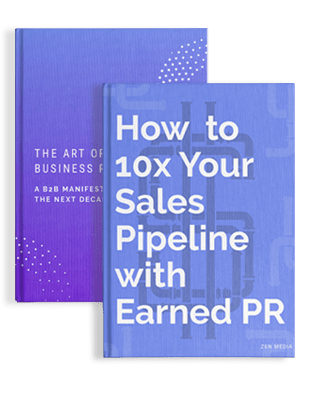Shama Hyder:
If you were trying to purchase for a business, you were trying to avoid regret, right? You don’t want to wake up the next day and say, “I shouldn’t have bought those shoes,” or “I really shouldn’t have gotten that gaming console.” Your customer is trying to avoid regret.
In a B2B transaction, where someone is purchasing for their business, not necessarily their own business, but they’re working, like you’re working somewhere and you’re buying something for the company, your prospects are trying to avoid blame.
In the last few years there’s been a common school of thought, which says there’s no business to business, no business to consumer. So no B2B, no B2C. It’s all H2H, human to human. And while that’s true in the big scheme of things – hopefully if you’re watching this, you are selling to other human beings and certain principles of psychology and sales and such apply – there is, in fact, a huge difference when it comes to selling business to business and business to consumer. And I’m going to tell you exactly what that is, and hopefully it’ll be a game changer for you.
So in a B2C transaction, when a business is selling to a customer, a consumer, when you are trying to sell directly to a consumer, that consumer, so now you, if you were trying to purchase from a business, you were trying to avoid regret, right? You don’t want to wake up the next day and say, “I shouldn’t have bought those shoes,” or “I really shouldn’t have gotten that gaming console.” Your customer is trying to avoid regret. So everything they’re doing, when they’re going through that purchase cycle, when they’re looking to deciding whether they’re going to buy that bag of chips to try, or whether it’s a bigger, whether they’re going to buy the new iPhone, whatever it is, they’re looking to avoid regret. Now, in a B2B transaction, where someone is purchasing for their business, and not necessarily their own business, but they’re working, like you’re working somewhere, you’re buying something for the company, your prospects are trying to avoid blame.
This is really a game changer, guys, if you understand it. In a B2C transaction, a consumer, a customer is trying to avoid regret. They don’t want to wake up the next day and say, “Ugh, I can’t believe I bought this.” In a B2B transaction, where the stakes are often a lot higher – sometimes your job is on the line – that’s a very different game. You are trying to avoid blame. Most B2B buyers are trying to avoid blame. Now, this isn’t a bad thing. It’s not to say they’re trying to shirk responsibility, but anytime it comes down to a B2B decision, safety, security and trust will win out.
When it comes to a consumer decision, someone might have a whim and say, “You know what? I just feel like trying something new.” “I just feel like doing something different.” “I feel like trying this new snack that’s out in the market.” “I want to shake things up.” How often do you think that happens when a business buyer is on the other side of the table? Do you think, “Mm, let me throw something new my boss’ way.” Or do you think they’re saying, “If I take this to my boss and it’s recognizable and it’s trusted,” and let’s say it’s a new implementation of some sort of technology that we’re rolling out. Who do you think they go with? A name that their boss recognizes, knows, trusts, something everyone in the industry uses, or do they go with someone that no one’s really heard of, and they’re taking that risk? Why would they take that risk? So it’s really important to understand this, because when you are in a B2B scenario, it means you have to approach it very differently. You have to realize the buyer’s intent is to avoid blame. It’s to make sure that they’re going with the safest choice, and it’s not always the best product or service. A good product, a good sales process, these are table stakes in B2B now. What really matters, what absolutely is crucial is how much they trust the brand, how safe they feel with it. Is this a reputable company that they’re buying from? Is this something that, when they put the proposal in front of their boss or they share it with their colleagues, they’re going to say, “Wait, who are these guys? Why are we looking at them?” Or are they going to say, “Oh yeah, I keep hearing about this. It looks like these guys are doing some interesting work.” And that is the difference between being invited to the table, closing the deal, and at the end of the day, revenue. So when someone says it’s all human to human, really think about what’s actually happening here. If you are in the B2B environment, what you are trying to cater to is very different than the person selling direct to consumers.

